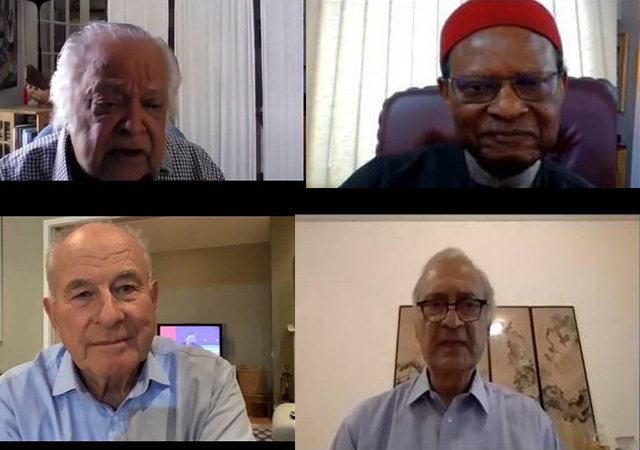 [Clockwise: Sir Shridath Ramphal, Chief Emeka Anyaoku, Kamalesh Sharma and Don McKinnon.]
[Clockwise: Sir Shridath Ramphal, Chief Emeka Anyaoku, Kamalesh Sharma and Don McKinnon.]
Today’s Commonwealth Secretariat – from its staffing to its ties with leaders – has been shaped subtlety over the years by its secretaries-generals. Within the Commonwealth Secretariat, the secretary general is often referred to as “SG”.
In a series of virtual interviews during the COVID-19 lockdown summer of 2020, The Round Table: The Commonwealth Journal of International Affairs, posed a range of questions provided by the Round Table’s Editorial Board to the four living secretaries-general.
The interviews seek to probe the thinking behind the changes made by each Secretary General during their time in office. The interviewees Sir Shridath (‘Sonny’) Ramphal (1975-1990), Chief Emeka Anyaoku (1990-2000), Sir Donald McKinnon (2000-2008) and Mr Kamalesh Sharma (2008-2016) spoke to Round Table Board member Rita Payne.
Shridath Ramphal recalled his dealings with the late Margaret Thatcher when the Commonwealth took on South Africa’s apartheid system. He also addressed modern-day issues including the statue of Cecil Rhodes in Oxford and globalisation after the COVID-19 pandemic. The transcript is now available.
Emeka Anyaoku talks about taking up the mantle left by Shridath Ramphal, the push for the empowerment of the Commonwealth Ministerial Action group (CMAG) and China’s role in the Commonwealth and in Africa. The transcript is now available.
Don McKinnon looks at the challenges of dealing with Zimbabwe and Pakistan’s President Musharaff, the power of a former politician as Commonwealth Secretary General and the way to attract good publicity for the secretariat as a path to better funding. The transcript is now available.
In the final interview, Kamalesh Sharma looks at India’s enduring contribution to the Commonwealth and the role of the modern body in a post-pandemic world. The full article is now available.
The Editor of The Round Table, Venkat Iyer, said that transcripts of the interviews will be published shortly in the pages of the journal and he hopes that they will serve as valuable reference material for those researching the history and evolution of the Commonwealth In the twentieth and twenty-first centuries.



